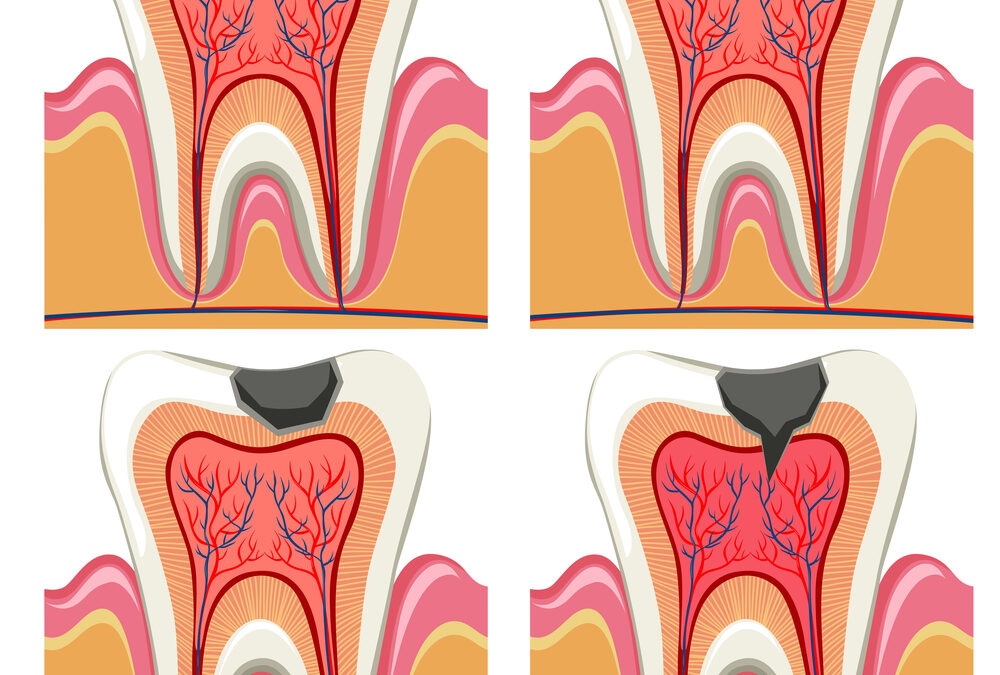Dr. Thomas Brown uses the most modern and effective techniques for root canal therapy. Often in a single appointment (though sometimes two are necessary), root canal therapy alleviates the acute, intense toothache caused by an internal tooth infection. Root canal therapy (RCT) also preserves a tooth, so extraction and replacement aren’t required. This saves the patient from additional discomfort and expense.
In this blog, we’ll explore some of the most commonly asked root canal questions on Google Search. If you have additional questions, would like a second opinion about a root canal diagnosis, or want to schedule an appointment with Dr. Brown in our Naperville dental office, call us at 630-369-3120 today.
Frequently Asked Questions
Is root canal therapy the same as a root canal?
Yes. These phrases can be confusing, so here are the definitions:
Root Canal Therapy (RCT): A procedure in which the dentist extracts infected tissue and replaces it with manmade material to preserve a tooth. Also called a “root canal.”
Root Canal: Sometimes used as a shortened version of “root canal therapy,” the phrase “root canal” is an anatomical term that refers to a nerve-containing canal within a tooth’s root.
Is it bad to ignore needing a root canal?
Yes! A tooth that becomes internally infected will not heal if left alone. Instead, the bacteria that infiltrated the tooth’s inner core will reproduce and cause significant pressure within the tooth, pressing against a nerve to create sharp pain. Without treatment, the infection will spread to the tooth’s tip, then into the jawbone and neighboring teeth. Do not ignore a root canal diagnosis.
How can I get root canal therapy if I can’t afford it?
Dr. Brown and our team want every single patient to afford the care they need to sustain good oral health, because oral health impacts overall health and quality of life. If you cannot pay for a root canal procedure in full and do not have a credit card, consider applying for CareCredit. This patient financing institution offers low- and no-interest payment plans for qualified applicants.
Is root canal therapy recommended?
If your dentist recommends root canal therapy, your tooth suffers from an internal infection that cannot be treated by any other procedure. You can opt for a second opinion, and Dr. Brown is happy to provide his expert advice at your appointment. If you reject treatment for an internally infected tooth, the only other option is to extract the tooth and replace it with an implant or bridge. If you reject all treatments, the infection can go so far as to destroy bone tissue in your jaw. A damaged tooth will never, ever heal on its own.
Is it better to go to a dentist or endodontist for root canal therapy?
Endodontists are specialists who offer root canal therapy. Some general dentists, like Dr. Brown, also offer RCT for most root canal cases. Dr. Brown may refer you to an endodontist if your root canal therapy will be very complex. However, Dr. Brown has the training and experience to perform most root canal procedures in our Naperville dental office, where you’ll feel well cared for and comfortable. Note that if needed, we offer sedation to help patients overcome anxiety and fear.
How long does root canal therapy last?
When a tooth has undergone root canal treatment and crown placement, it can last a lifetime. However, many factors contribute to the longevity of RCT. The patient should practice excellent oral health habits at home and come in for six-month checkups and cleanings.
In some cases, a tooth with two roots may develop an infection so small that it cannot be detected by a dentist, even with magnification. This is rare, but when it occurs, pain may present long after the root canal was performed. Additionally, when a tooth previously treated with RCT incurs additional damage, like a crack due to teeth grinding, the root canal may fail.
Lastly, if a dental crown isn’t placed on a tooth after root canal therapy, the treatment is likely to last only 10-15 years. A crown seals the entry point for RCT, ensuring that the affected tooth can endure the crushing pressures of biting and chewing, as well as temperature fluctuations and oral bacteria.
We Have Answers About Root Canals
Do you have more questions about root canal therapy? Call our Naperville dental office at 630-369-3120 today to schedule your consultation, new patient appointment, or second-opinion visit with Dr. Brown. We will get you out of pain and provide treatment intended to last for decades.

